UV Lights and How They Can Help Your Furnace
Cody Roy Ferguson • April 23, 2025
UV Lights
UV light helps to kill or inactivate airborne bacteria, viruses, mold, and other pathogens as they pass through the HVAC system.
This can lead to improved indoor air quality by reducing the concentration of harmful microorganisms circulating in the air
UV light also helps to eliminate unpleasant odors in the air by neutralizing odor-causing bacteria.
This can be particularly useful in environments where odors are a concern, such as homes with pets or commercial facilities.
Aswell by preventing microbial growth and reducing the accumulation of debris on HVAC components, UV light can help to extend the life of the HVAC system.
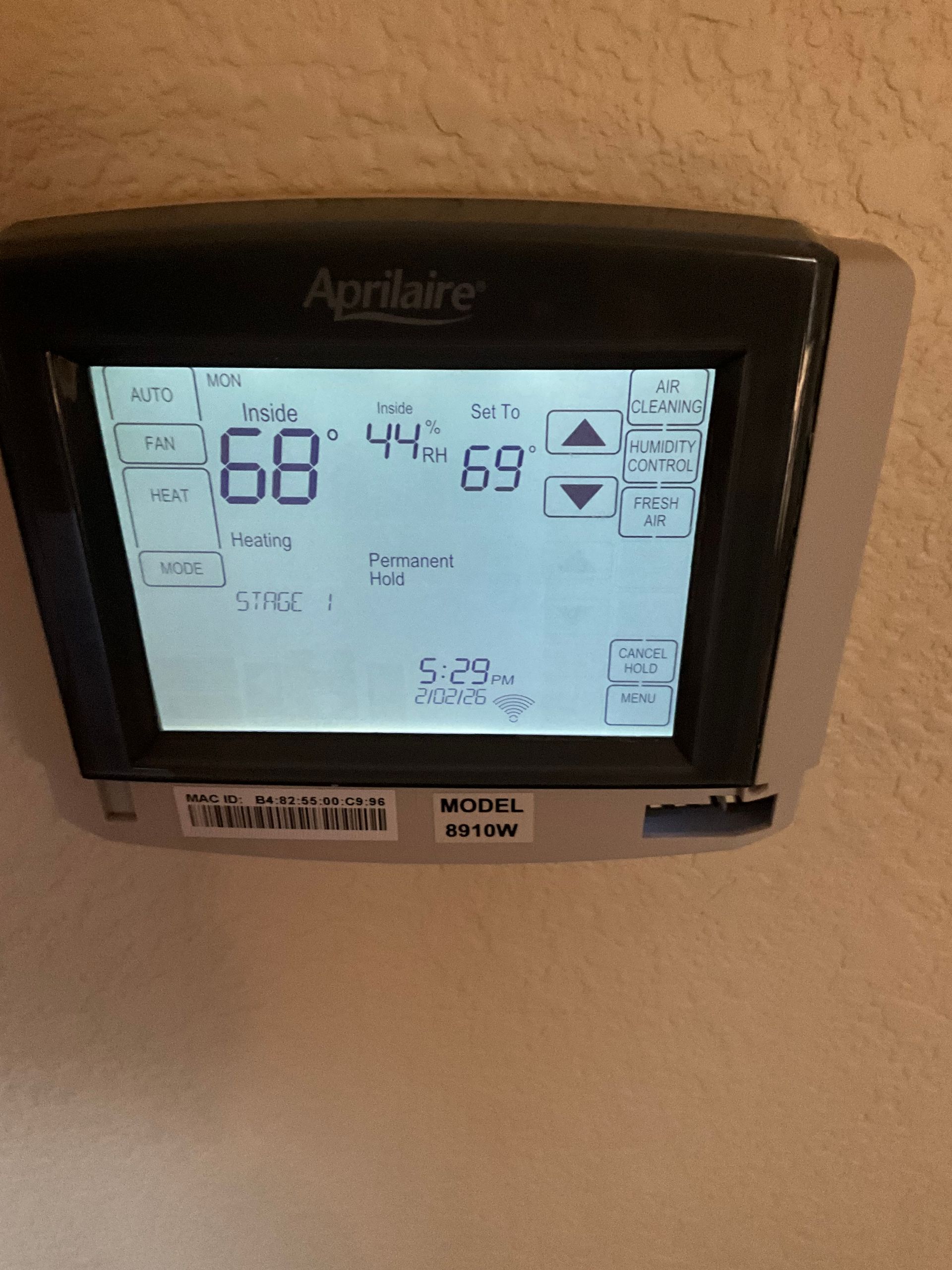
Smart thermostats are one of the highest-ROI HVAC upgrades homeowners can make. Search demand for “smart thermostat benefits,” “best smart thermostat,” and “smart thermostat savings” continues to rise because these devices deliver measurable energy savings, better comfort control, and proactive HVAC protection . What Is a Smart Thermostat? A smart thermostat connects to Wi-Fi and uses sensors, schedules, and algorithms to optimize heating and cooling automatically. Leading platforms from Google Nest, ecobee, and Honeywell Home integrate mobile apps, geofencing, and system diagnostics. Key Benefits (Why Homeowners Are Switching) 1) Lower Energy Bills (10–20% Typical Savings) Adaptive schedules reduce run time when you’re asleep or away Learning algorithms prevent over-conditioning Utility rebates may apply in many regions 2) Precision Comfort Room sensors balance hot/cold spots Zoning compatibility improves multi-story comfort Gradual recovery avoids temperature overshoot 3) Remote Control & Alerts Adjust settings from your phone anywhere Receive maintenance reminders and fault alerts Freeze-protection notifications during cold snaps 4) HVAC System Protection Short-cycle prevention reduces wear on compressors and igniters Filter change reminders protect airflow and efficiency Usage analytics highlight abnormal run patterns early 5) Smarter Scheduling = Less Wear Occupancy detection trims unnecessary cycles Weather-aware preheating/precooling smooths peak demand Bottom Line A smart thermostat delivers immediate comfort gains and long-term cost control while reducing HVAC wear . For best results, confirm system compatibility and have the device commissioned by an HVAC professional so advanced features (staging, fan logic, heat-pump balance points) are configured correctly. Any Other Questions? Call us at 720-737-7311
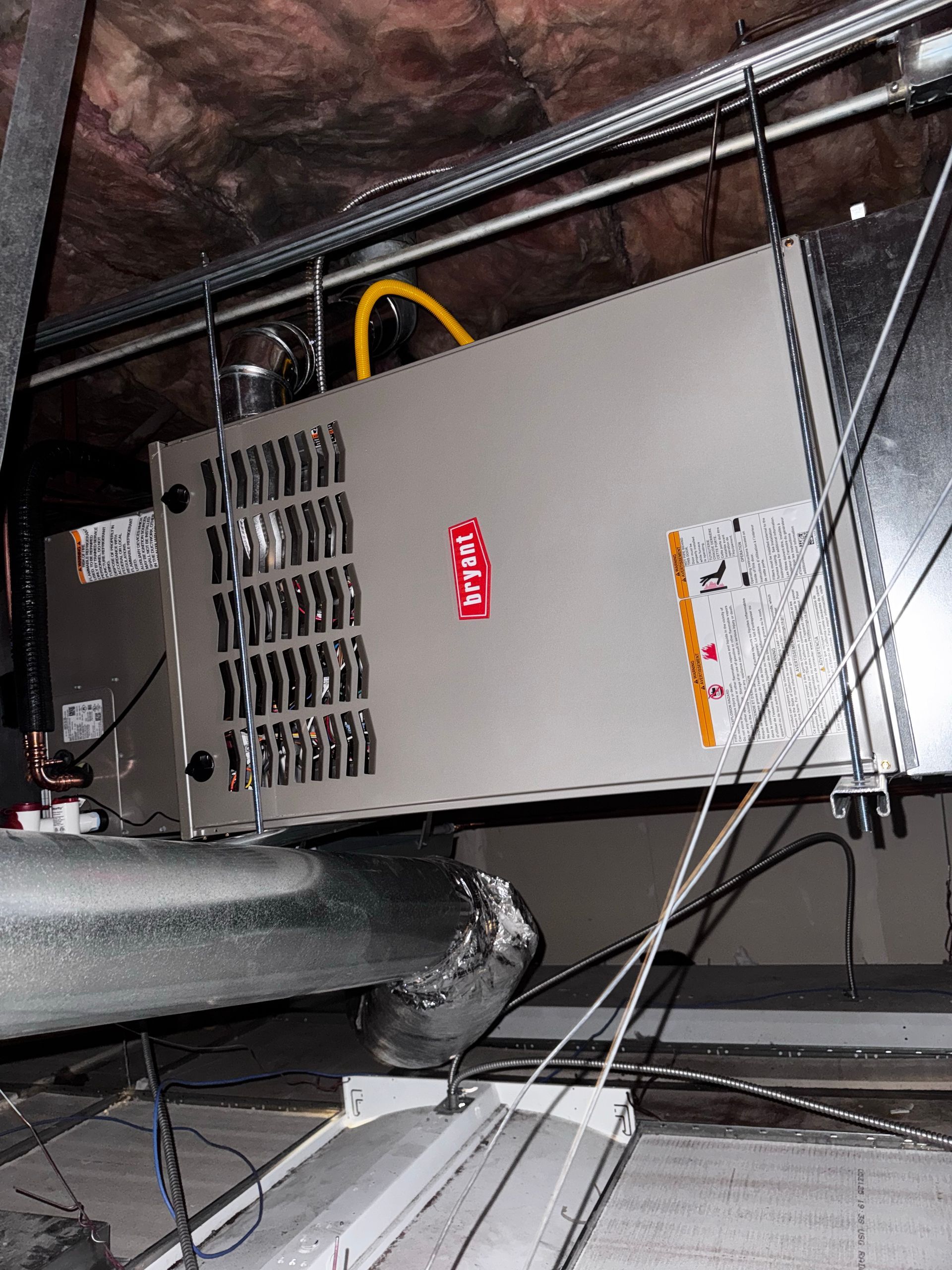
When winter hits Colorado, a working furnace isn’t just about comfort — it’s about safety . If you’ve ever found yourself searching “furnace repair near me” during a cold snap, you know how quickly a heating issue can turn into an emergency . Denver’s fluctuating temperatures, dry air, and sudden cold fronts can put serious strain on residential heating systems . In this guide, we’ll walk through the most common furnace problems in Denver homes , what you can safely check yourself, and when it’s time to call a professional furnace repair company. Why Furnaces Fail More Often in Denver Colorado’s climate creates unique challenges for heating systems. Rapid temperature drops force furnaces to cycle more frequently, which increases wear on critical components. Over time, this can lead to: Ignition system failures Clogged air filters and restricted airflow Thermostat communication issues Blower motor strain Cracked heat exchangers due to expansion and contraction Altitude can also impact furnace performance. Many systems in the Denver metro area need proper calibration to ensure efficient combustion and safe operation. Common Furnace Problems Homeowners Search For When people look up “furnace repair Denver,” these are usually the issues they’re dealing with: 1. Furnace Won’t Turn On This could be caused by a tripped breaker, a faulty thermostat, or a failed ignition system. Sometimes it’s as simple as a dirty filter restricting airflow and triggering a safety shutoff. 2. Cold Air Blowing From Vents If your furnace is running but not producing warm air, the problem may be a malfunctioning pilot light, flame sensor, or gas supply issue. 3. Strange Noises Banging, rattling, or squealing often points to loose components, worn belts, or blower motor problems that need professional attention before they cause bigger damage. 4. Short Cycling If your furnace turns on and off repeatedly, it could be overheating due to poor airflow, a clogged filter, or a faulty limit switch. What You Can Check Before Calling for Furnace Repair While some problems require a licensed HVAC technician, there are a few safe steps homeowners can take: Check your thermostat settings — Make sure it’s set to “heat” and the temperature is above room level Replace your air filter — Dirty filters are one of the most common causes of furnace shutdowns Inspect the breaker panel — A tripped breaker can stop your furnace from powering on Check vents and returns — Make sure they aren’t blocked by furniture or rugs If these steps don’t restore heat, it’s time to contact FerguSon's Heating & Cooling for furnace repair service in Denver. When Furnace Repair Becomes an Emergency Some heating issues shouldn’t wait, especially in freezing conditions . Call for emergency furnace repair if you notice: No heat when temperatures are below freezing The smell of gas or burning odors Carbon monoxide detector alerts Loud, unusual noises coming from the unit These situations can pose serious safety risks and should be handled by a trained HVAC technician immediately. Repair vs. Replacement: What Makes Sense? Many Denver homeowners wonder whether it’s better to repair their furnace or replace it. A general rule of thumb is: If your furnace is under 10 years old and the repair is minor , fixing it usually makes sense If it’s 15+ years old, requires frequent repairs, or has a cracked heat exchange r, replacement may be the more cost-effective option Modern high-efficiency furnaces can significantly reduce heating costs during Colorado’s long winters, making them a smart investment for older systems. The Importance of Preventative Furnace Maintenance The best way to avoid searching “furnace repair near me” in the middle of a cold night is regular maintenance . Annual furnace tune-ups can: Improve energy efficiency Extend system lifespan Catch small issues before they become major repairs Improve indoor air quality Ensure safe operation Scheduling inspection in the fall prepares your system for peak winter demand. Choosing a Trusted Furnace Repair Company in Denver When selecting a local HVAC company, look for: Licensed and insured technicians FerguSon's is! Strong local reviews and testimonials FerguSon's is! Transparent pricing FerguSon's is! Emergency service availability FerguSon's is! Experience with Colorado’s climate and home heating systems FerguSon's is! FerguSon's is a trusted local provider that understands the specific challenges Denver homeowners face and can recommend solutions tailored to your home and budget. Stay Warm All Winter Long Furnace problems never happen at a convenient time — but knowing what to watch for and who to call can make all the difference. Whether your system needs a quick fix or a full inspection , FerguSon's will help ensures your home stays safe, warm, and comfortable throughout the coldest months of the year. Any Other Questions? Call us at 720-737-7311

Winter in Colorado brings cold temperatures, snowy days, and more time spent indoors — especially for your pets . While keeping your home warm is a top priority, it’s just as important to ensure your heating system is pet-friendly, efficient, and safe . At FerguSon’s Heating & Cooling, we help homeowners create comfortable indoor environments for every family member—four-legged ones included. Here are some essential winter HVAC tips to help protect your pets and keep your home running efficiently all season long. 1. Protect Your Vents and Ductwork Pets love warm air, and floor vents can quickly become favorite nap spots. While this is adorable, blocked vents can restrict airflow and make your furnace work harder. Make sure vents remain clear and consider using vent covers that allow air to flow while keeping paws and fur out of your duct system. 2. Change Air Filters More Often Pet hair and dander can quickly clog your HVAC air filter , especially during winter when systems run more frequently . A dirty filter reduces indoor air quality and forces your furnace to work overtime . We recommend checking filters monthly and replacing them as needed to maintain clean air and optimal performance. 3. Maintain Safe Indoor Temperatures Pets are sensitive to extreme cold and heat. Keeping your thermostat set to a consistent, comfortable temperature helps protect them from cold drafts and sudden changes . A programmable or smart thermostat can help maintain steady warmth while improving energy efficiency. 4. Keep Heating Equipment Secure Curious pets may investigate furnaces, space heaters, or exposed HVAC components . Make sure your heating system is properly enclosed, and avoid placing pet beds or toys near heat sources to reduce the risk of accidents. 5. Schedule a Winter HVAC Tune-Up A professional furnace inspection ensures your system is running safely and efficiently . This not only helps prevent breakdowns during cold snaps but also ensures proper airflow and clean air circulation for you and your pets . Trust FerguSon’s Heating & Cooling This Winter Your pets depend on you to keep them warm, safe, and comfortable —and your HVAC system plays a major role in that. At FerguSon’s Heating & Cooling, we specialize in winter furnace maintenance , repairs , and indoor air quality solutions for Colorado homeowners. If you’re ready to give your home—and your pets— the comfort they deserve this winter , contact our team today to schedule your seasonal HVAC service. Any Other Questions? Call us at 720-737-7311
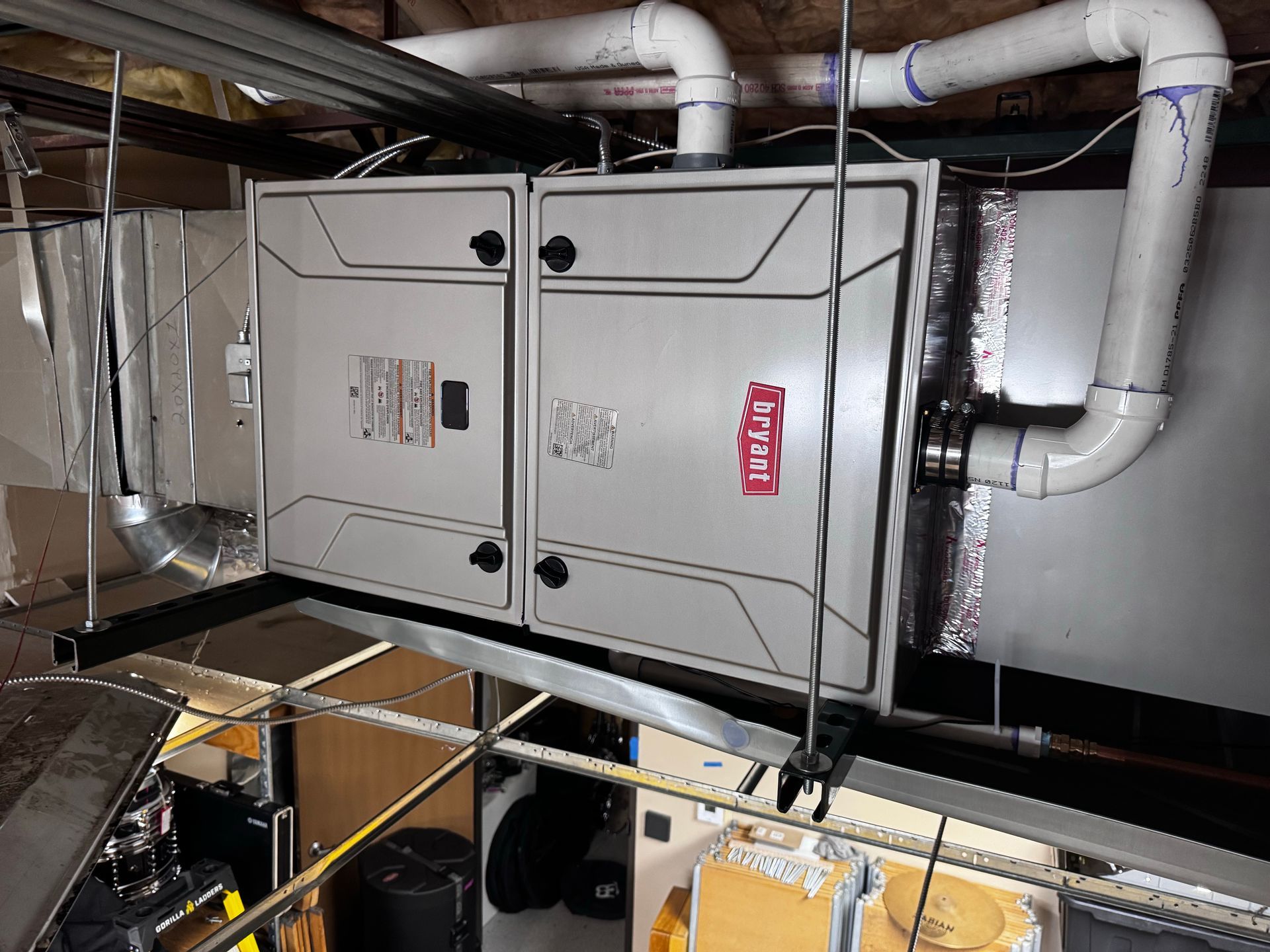
Colorado cold snaps are different from a typical winter day. Rapid temperature drops, high winds, and sudden snowstorms can push home heating systems to their limits—often exposing problems that stay hidden during milder weather. If your furnace seems to run constantly, struggles to keep up, or stops working altogether when temperatures plunge, you are not alone. Understanding why furnaces struggle in Colorado’s climate can help you prevent breakdowns, lower energy costs, and keep your home comfortable and safe. What Makes Colorado Cold Snaps So Hard on Furnaces? Rapid Temperature Swings A 40-degree temperature drop overnight forces your furnace to work longer cycles to maintain indoor comfort. This can stress motors, igniters, and heat exchangers—especially in older systems. High Altitude Effects Many areas along the Front Range and in mountain communities sit at elevations that can impact combustion efficiency. Furnaces not properly adjusted for altitude may burn fuel less efficiently, leading to reduced heating performance and higher energy bills. Dry Winter Air Colorado’s low humidity can make indoor air feel colder than it actually is. Homeowners often raise the thermostat to compensate, increasing system workload and utility costs. Snow and Ice Buildup High-efficiency furnaces use outdoor intake and exhaust pipes. Heavy snow or drifting ice can block these vents, causing system shutdowns or safety lockouts. Common Furnace Problems During Cold Snaps Short Cycling If your furnace turns on and off frequently, it may be overheating, experiencing airflow restrictions, or dealing with a faulty thermostat. Uneven Heating Cold rooms often point to duct leaks, blocked vents, or airflow imbalances—problems that become more noticeable when the system runs continuously. Rising Energy Bills Longer run times and reduced efficiency during extreme cold can cause sudden spikes in heating costs. Strange Noises Banging, rattling, or squealing can indicate loose components, blower motor issues, or expanding ductwork under temperature stress. Signs Your Furnace Needs Attention Before Winter Call a professional if you notice: Strange noises like banging or rattling Uneven heating throughout the home Rising energy bills without increased usage Short cycling (system turns on and off frequently) Yellow or flickering burner flames Addressing these issues early can prevent emergency repairs during peak winter demand. Colorado-Specific Energy-Saving Tips Set your thermostat to 68°F when home and lower when sleeping or away Use a humidifier to improve comfort at lower temperatures Keep garage doors closed to reduce heat loss in adjacent rooms Open blinds on sunny days to take advantage of natural heat gain Why Local HVAC Maintenance Makes a Difference Homes in Denver, Colorado Springs, Boulder, Fort Collins, and mountain communities experience different elevation and weather conditions. A local HVAC company understands how altitude, climate, and building codes impact system performance and safety. Schedule Your Winter HVAC Tune-Up Today The best time to service your heating system is before cold weather sets in . Preventative maintenance helps ensure reliable comfort, lower energy costs, and peace of mind throughout the winter season. If you are a homeowner in Littleton or surrounding Colorado communities, our experienced HVAC technicians are ready to help you prepare for winter with professional inspections, tune-ups, and expert recommendations . FAQ: Colorado Winter HVAC Maintenance How often should I service my furnace? At least once per year, ideally in early fall before heavy use begins. Do heat pumps work well in Colorado winters? Modern cold-climate heat pumps can perform effectively, especially when paired with a backup heating system. Is furnace maintenance required for warranties? Many manufacturers require documented annual maintenance to keep warranties valid. Any Other Questions? Call us at 720-737-7311

Colorado winters are not just cold—they are unpredictable . From sudden temperature drops along the Front Range to heavy snow in the foothills and mountain communities, your home’s heating system needs to be prepared long before the first freeze hits. A properly maintained HVAC system does more than keep your family comfortable. It improves energy efficiency, extends equipment lifespan, reduces the risk of mid-winter breakdowns, and helps ensure your home stays safe during extreme weather. Why Winter HVAC Prep Matters in Colorado Colorado’s climate presents unique challenges for heating systems: Rapid temperature swings can stress furnaces and heat pumps High altitude can affect combustion efficiency and airflow Dry air can impact comfort, indoor air quality , and system performance Heavy snow can block vents and exhaust pipes Preventative maintenance helps your system operate reliably when you need it most— during sub-zero nights and winter storms when service availability can be limited. Pre-Winter HVAC Maintenance Checklist 1. Replace or Clean Your Air Filter A dirty filter restricts airflow, forcing your furnace to work harder and increasing energy costs. Recommended schedule: Check monthly during winter Replace every 1–3 months depending on pets , dust levels, and filter type Local tip: Colorado’s dry climate can increase airborne dust, especially in newer developments and high-traffic areas. 2. Test Your Thermostat Before cold weather arrives: Switch the thermostat to “heat” Raise the temperature 5 degrees above room temperature Confirm the system turns on and delivers warm air Consider upgrading to a smart thermostat for better energy efficiency and remote temperature control during travel or storms. 3. Inspect Furnace Exhaust and Intake Pipes Snow and debris can block vents, causing dangerous exhaust backup or system shutdowns. Walk around your home and: Clear leaves, snow, and dirt from all exterior pipes Make sure vents are at least 12 inches above ground level 4. Check Carbon Monoxide and Smoke Detectors Gas furnaces produce combustion gases that must be safely vented outdoors . Test all detectors and replace batteries . This is one of the most important safety steps homeowners can take before winter. 5. Inspect Air Ducts and Vents Make sure: Supply and return vents are open and unobstructed Furniture, rugs, or curtains are not blocking airflow If some rooms feel colder than others, you may have duct leakage or airflow imbalance that needs professional evaluation. 6. Seal Drafts and Insulate Heating efficiency is not just about your furnace. Check for air leaks around: Windows and doors Attic access points Basements and crawl spaces Proper insulation and weather sealing can significantly reduce heat loss and lower monthly utility bills. 7. Schedule a Professional HVAC Tune-Up A licensed HVAC technician at Ferguson's can: Inspect burners and heat exchangers Test gas pressure and ignition systems Check electrical connections Measure airflow and system efficiency Identify worn parts before they fail Annual maintenance can improve system performance and often helps preserve manufacturer warranties Signs Your Furnace Needs Attention Before Winter Call a professional if you notice: Strange noises like banging or rattling Uneven heating throughout the home Rising energy bills without increased usage Short cycling (system turns on and off frequently) Yellow or flickering burner flames Addressing these issues early can prevent emergency repairs during peak winter demand. Colorado-Specific Energy-Saving Tips Set your thermostat to 68°F when home and lower when sleeping or away Use a humidifier to improve comfort at lower temperatures Keep garage doors closed to reduce heat loss in adjacent rooms Open blinds on sunny days to take advantage of natural heat gain Why Local HVAC Maintenance Makes a Difference Homes in Denver, Colorado Springs, Boulder, Fort Collins, and mountain communities experience different elevation and weather conditions. A local HVAC company understands how altitude, climate, and building codes impact system performance and safety. Schedule Your Winter HVAC Tune-Up Today The best time to service your heating system is before cold weather sets in . Preventative maintenance helps ensure reliable comfort, lower energy costs, and peace of mind throughout the winter season. If you are a homeowner in Littleton or surrounding Colorado communities, our experienced HVAC technicians are ready to help you prepare for winter with professional inspections, tune-ups, and expert recommendations . FAQ: Colorado Winter HVAC Maintenance How often should I service my furnace? At least once per year, ideally in early fall before heavy use begins. Do heat pumps work well in Colorado winters? Modern cold-climate heat pumps can perform effectively, especially when paired with a backup heating system. Is furnace maintenance required for warranties? Many manufacturers require documented annual maintenance to keep warranties valid. Call us at 720-737-7311
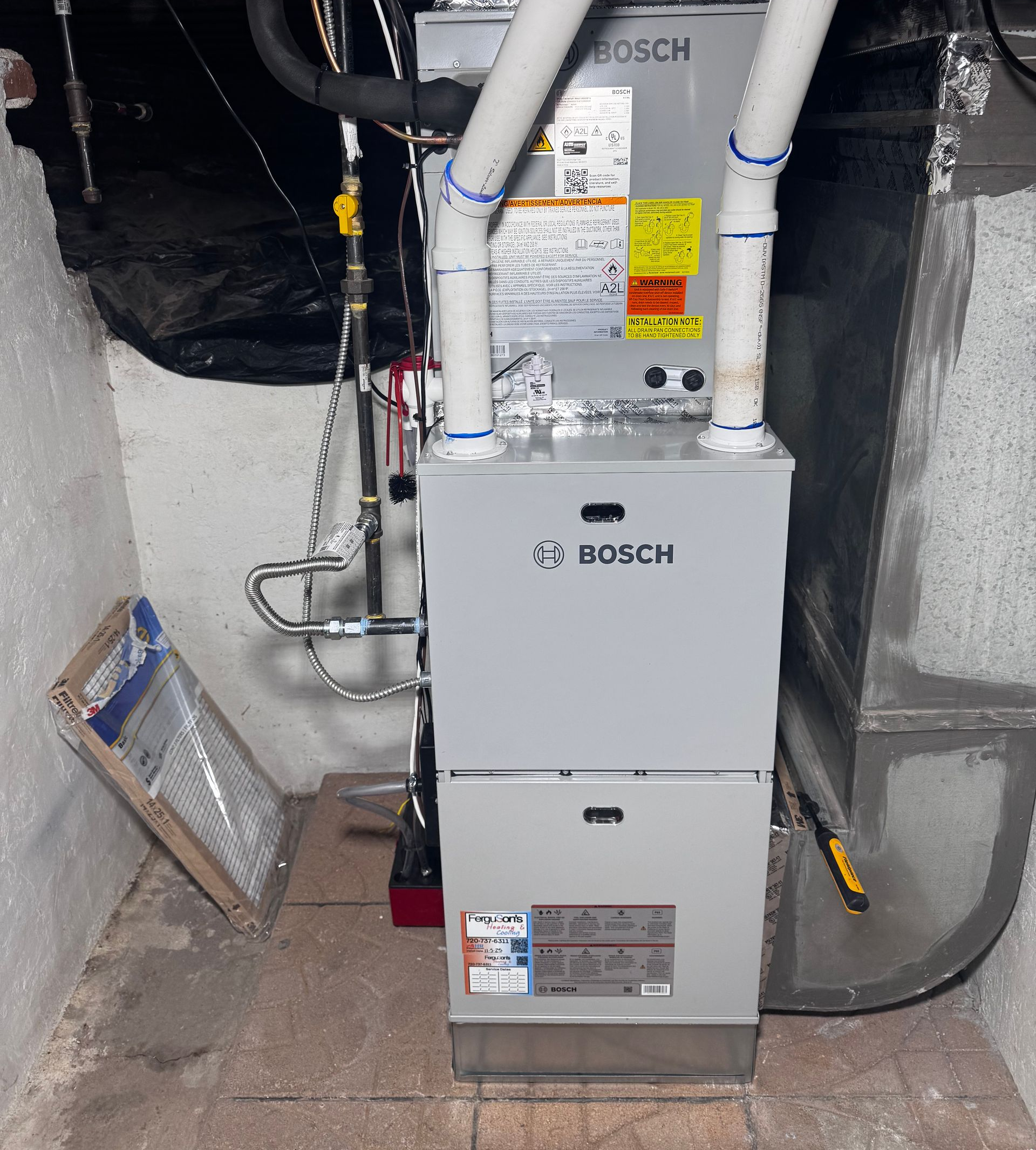
As Colorado continues to focus on cleaner air and environmental responsibility, homeowners are hearing more about Low NOx furnaces. If you’re planning to replace your furnace or upgrade your HVAC system, understanding what Low NOx means—and why it matters in Colorado—can help you make a smarter, future-ready decision. What Does “Low NOx” Mean? NOx stands for nitrogen oxides, a group of gases produced when fuel is burned at high temperatures. Traditional gas furnaces release NOx as a byproduct of combustion, which contributes to: Smog and ground-level ozone Poor air quality Respiratory and environmental health issues A Low NOx furnace is specifically designed to reduce the amount of nitrogen oxides released during operation by using advanced burner technology and controlled combustion. Why Low NOx Furnaces Are Important in Colorado Colorado’s Front Range, including the Denver metro area, has faced increasing air quality challenges over the years. High altitude, population growth, and vehicle and appliance emissions all contribute to ozone pollution. Because of this, Colorado has adopted stricter emissions standards for gas appliances, including furnaces. Low NOx furnaces help: Reduce harmful emissions that affect local air quality Support statewide environmental and clean-air initiatives Protect sensitive groups, such as children, seniors, and those with asthma In many Colorado municipalities, Low NOx furnaces are now required for new installations or replacements.
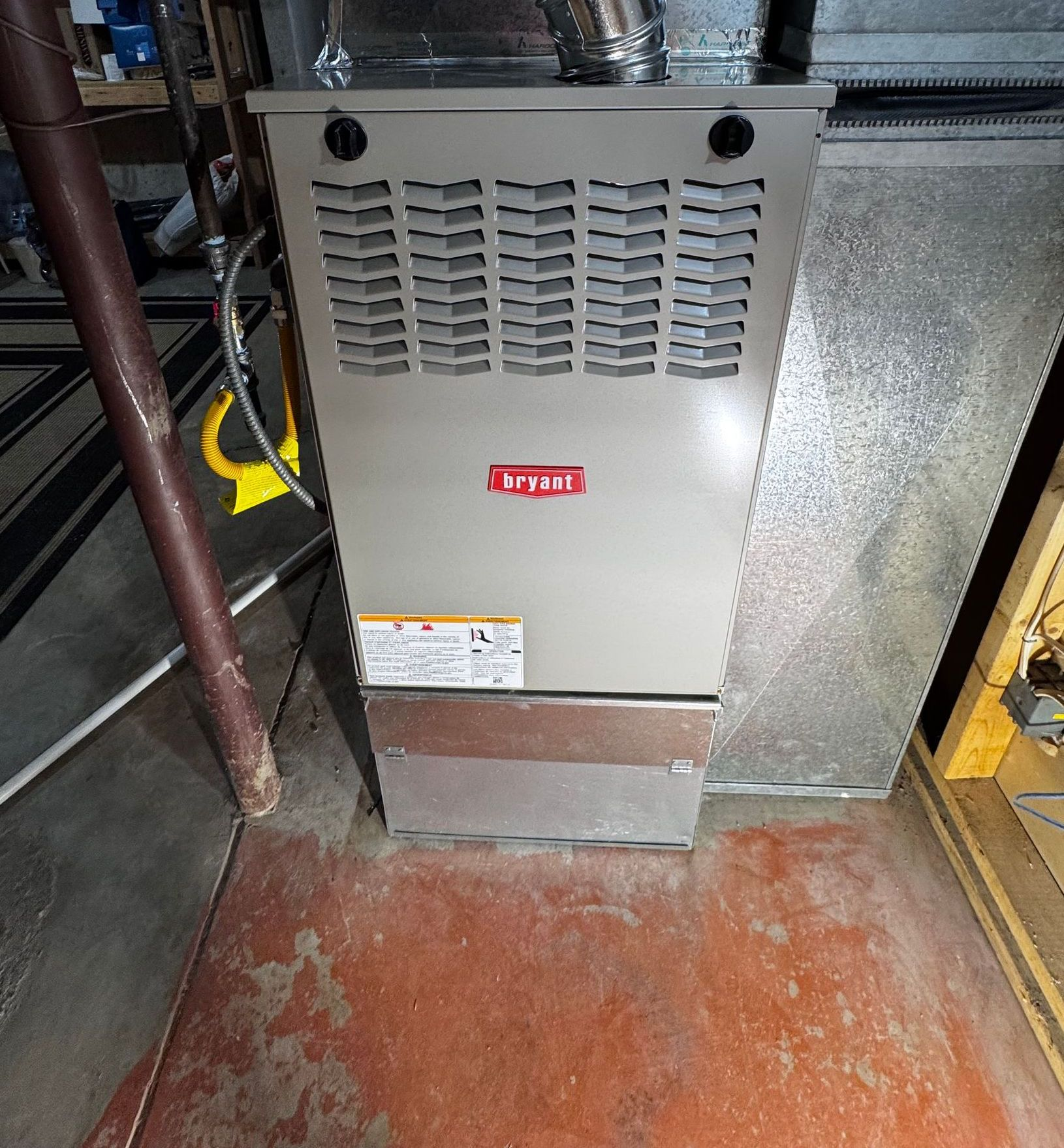
If you’ve been considering replacing your furnace, there’s an important industry shift happening that homeowners need to know about: 80% AFUE furnaces may be going away soon, and once they do, the cost of replacing your heating system is almost guaranteed to rise . For decades, 80% furnaces have been a reliable, affordable option. But new regulations and manufacturing changes mean they may not be available for much longer . That makes right now the best—and possibly the last—window to install a cost-effective 80% unit before prices climb and choices shrink. Here’s what’s happening and why acting now can save you money. What’s an 80% Furnace, and Why Are They So Popular? An 80% AFUE furnace converts 80% of the fuel it burns into heat. These furnaces are popular because: They’re less expensive than high-efficiency (90–98%) models. They don’t require PVC venting or a condensate drain . Installation is simplified, fast, and inexpensive—especially in older homes or houses with venting limitations. They offer reliable heating with lower upfront costs . But that simplicity and low cost are exactly why homeowners should act before they’re gone . Why 80% Furnaces Might Be Disappearing 1. Efficiency Regulations Are Tightening Upcoming federal and state efficiency standards are pushing manufacturers toward higher AFUE ratings. As these requirements roll out, 80% furnaces may no longer meet minimum standards in many regions. 2. Manufacturers Are Cutting Back Production When regulations tighten, manufacturers shift production to higher-efficiency units. This means: Fewer 80% models will be made Fewer units will be stocked by distributors Prices will rise as inventory gets scarce This has already happened with other HVAC equipment( see R-454b refrigerant ) —once production slows, prices go up quickly. 3. Certain Markets Are Already Phasing Them Out Some states (including Colorado) are moving toward eliminating lower-efficiency gas appliances. Even if your state isn’t mandating changes yet, national manufacturing trends affect everyone . What Happens When 80% Furnaces Are Gone? If your home currently uses an 80% furnace and it fails after the phase-out , your only replacement option may be a high-efficiency condensing furnace, which requires: PVC venting or re-venting existing ducts A condensate drain line and pump Additional installation materials and labor That means a significantly higher total cost, even if the equipment price is similar. For many homes—especially townhomes, condos, interior closets, and tight attics—i nstalling a high-efficiency furnace can be far more complicated and expensive than replacing an 80% unit. Why Now Is the Best Time to Buy an 80% Furnace 1. Prices Are Lower Right Now As long as 80% furnaces are still being produced, they remain the cheapest furnace option. Once production slows or stops, prices will rise quickly due to: Limited inventory Increased demand from last-minute buyers The shift toward more expensive high-efficiency components Buying now avoids that inflation. 2. Installations Are Simple and Affordable Right now, swapping an older 80% furnace for a new 80% model is straightforward. No major home modifications needed. Once these units disappear, you may face: Major venting work Higher labor charges Longer installation times More invasive construction Upgrading today prevents a future headache. 3. Perfect for Homes Where High Efficiency Is Difficult Some homes simply aren’t designed for high-efficiency venting without costly retrofits. If you live in: A multi-story home A condo or townhouse A home with interior mechanical rooms A tight crawlspace or attic … you could be looking at thousands of dollars in additional work if 80% options vanish. 4. You Lock In a Replacement Before a Crisis Most furnaces fail during the coldest days of winter—when demand is highest and prices spike. Replacing proactively ensures: Better pricing More model choices No emergency install fees The Bottom Line: If You Want an 80% Furnace, Don’t Wait The industry is moving toward higher efficiency standards, and 80% furnaces are likely to become harder to find—and more expensive—very soon. If your furnace is aging, unreliable, or over 15 years old, now is the ideal time to replace it while: Inventory is still strong Prices are still low Installation is still simple Once the shift happens, y ou may lose the option entirely—and face a much more expensive replacement. Call us at (720)-737-6311
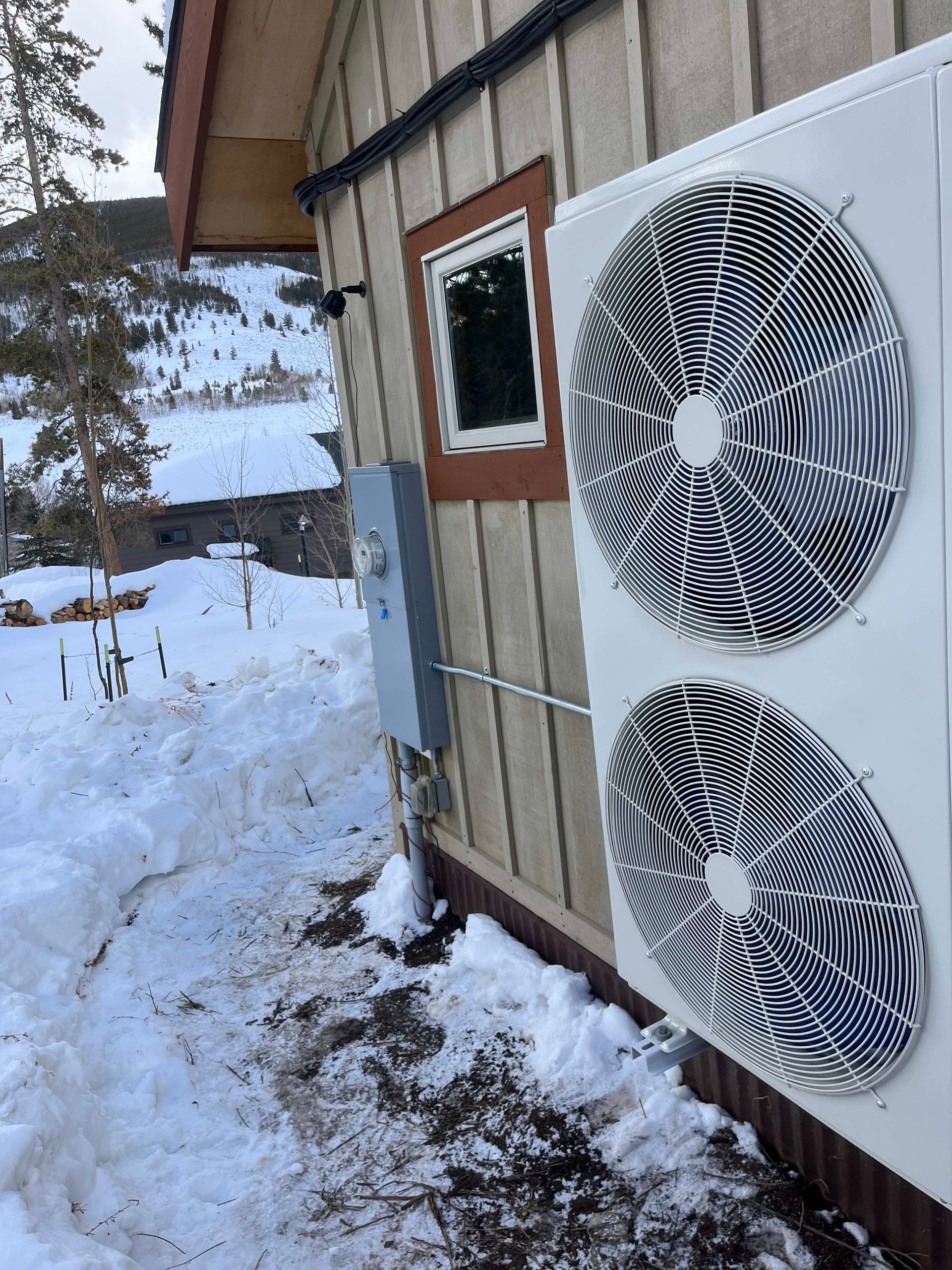
When it comes to saving energy and staying comfortable at night, homeowners often ask: “Should I turn off my AC at night?” In this blog, we’ll break down the pros and cons so you can make the right choice for your home—and your energy bill. The Quick Answer No, you typically shouldn’t turn off your AC completely at night , especially during warm seasons . I nstead, consider turning the thermostat up a few degrees or using energy-saving features like programmable thermostats or “sleep” modes. Why People Consider Turning Off Their AC at Night There are two main reasons homeowners think about turning off their AC at night: To Save on Energy Costs: It makes sense—if the AC isn’t running, it’s not using electricity. But the actual savings might not be as big as you expect , especially if your home heats up overnight and your system has to work harder to cool it down in the morning. For Health or Comfort: Some people feel too cold while sleeping with the AC on. Others are concerned about air quality or dryness caused by constant air conditioning. Here’s What Really Happens If You Turn It Off Turning off your air conditioner completely can lead to: Increased Humidity: Without your AC running, humidity levels in your home can rise , making it feel warmer and less comfortable. Disrupted Sleep: Studies show people sleep better in cooler temperatures (around 60-67°F). Turning off your AC might make it harder to fall or stay asleep. Overworking Your AC Later: If your home heats up overnight, your system will need to work harder in the morning to bring the temperature back down, which could cancel out any energy savings. Better Alternatives to Turning Off Your AC at Night Instead of shutting it down completely, here are a few smarter ways to stay cool and save money: Use a Programmable or Smart Thermostat Set your thermostat to increase the temperature by 2–4°F at night . You likely won’t notice a big change in comfort, but you will see a difference on your energy bill. Turn on ‘Sleep’ or Eco Modes Many modern AC units have energy-saving features that automatically adjust cooling at night to maintain comfort with less energy use. Improve Home Insulation A well-insulated home retains cool air longer , meaning your AC doesn’t have to run as often—even during the night. Use Fans to Circulate Air A ceiling or box fan can help circulate cool air and make your bedroom feel more comfortable without lowering the thermostat. The Bottom Line Turning off your AC at nigh t isn’t usually the best move . Instead, adjust the temperature settings, use fans, and rely on smart technology to strike the perfect balance between comfort and energy efficiency. I f your energy bills are climbing or your AC isn’t keeping up, it might be time for a system check. Contact our team at FerguSon's—we're here to keep your home cool, efficient, and comfortable all summer long. Call us at (720)-737-6311

As the leaves begin to change and the air turns crisp, it’s the perfect time to enjoy pumpkin spice everything and cozy sweaters. But before you dive into full fall mode, there’s one essential item to check off your to-do list: getting your HVAC system ready for the season. A fall HVAC check-up isn’t just a good idea— it’s a must. And why now is the perfect time to schedule your appointment with us. 1. Prevent Surprise Breakdowns After working hard all summer to keep your home cool, your HVAC system needs some TLC. Without maintenance, small issues can turn into major breakdowns—often right when you need heat the most. Don’t get left in the cold. A quick fall inspection now can prevent an emergency repair later . 2. Improve Energy Efficiency A well-maintained HVAC system runs more efficiently, saving you money on your energy bills. Dusty filters, worn-out parts, and thermostat issues can make your system work harder than it needs to. We’ll make sure your system is running at peak performance, so you stay comfortable and save money all season long. 3. Extend the Life of Your System Routine maintenance can add years to the life of your HVAC unit. Think of it like a car—regular tune-ups mean fewer breakdowns and better long-term performance. An HVAC tune-up now is an investment in your system’s future. 4. Improve Indoor Air Quality Fall allergens like mold, ragweed, and dust mites can sneak into your home and linger. During a maintenance visit, we check and replace filters, clean your system, and make sure your air is as fresh as the autumn breeze. Breathe easy this fall. We’ll help keep your indoor air clean and healthy. 5. Avoid the Seasonal Rush Every year, we see a spike in calls right as the first cold snap hits . Appointments fill up fast—and if your heat goes out, you could be stuck waiting . Beat the rush and schedule early. That way, your system is ready when you need it most. Ready to Book Your Fall HVAC Tune-Up? Don't wait for the cold weather to take you by surprise. Call FerguSon's Heating & Cooling today and get ahead of the season with professional HVAC maintenance from our trusted technicians. 📞 Call us now at 720-737-6311 or 💻 Book your appointment online under the contact Page Bonus : Ask about our Fall Tune-Up Special—limited-time discounts available while appointment slots last! (mention this post!)
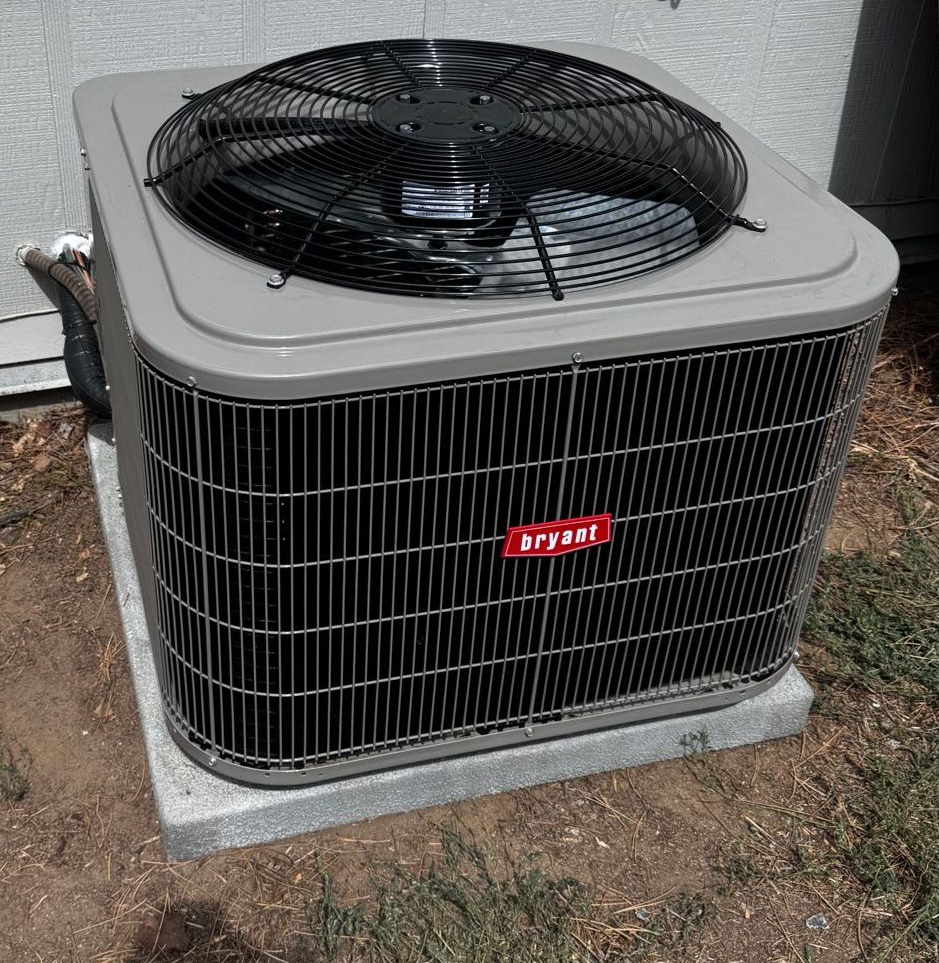
When it comes to saving energy and staying comfortable at night, homeowners often ask: “Should I turn off my AC at night?” In this blog, we’ll break down the pros and cons so you can make the right choice for your home—and your energy bill. The Quick Answer No, you typically shouldn’t turn off your AC completely at night , especially during warm seasons . I nstead, consider turning the thermostat up a few degrees or using energy-saving features like programmable thermostats or “sleep” modes. Why People Consider Turning Off Their AC at Night There are two main reasons homeowners think about turning off their AC at night: To Save on Energy Costs: It makes sense—if the AC isn’t running, it’s not using electricity. But the actual savings might not be as big as you expect , especially if your home heats up overnight and your system has to work harder to cool it down in the morning. For Health or Comfort: Some people feel too cold while sleeping with the AC on. Others are concerned about air quality or dryness caused by constant air conditioning. Here’s What Really Happens If You Turn It Off Turning off your air conditioner completely can lead to: Increased Humidity: Without your AC running, humidity levels in your home can rise , making it feel warmer and less comfortable. Disrupted Sleep: Studies show people sleep better in cooler temperatures (around 60-67°F). Turning off your AC might make it harder to fall or stay asleep. Overworking Your AC Later: If your home heats up overnight, your system will need to work harder in the morning to bring the temperature back down, which could cancel out any energy savings. Better Alternatives to Turning Off Your AC at Night Instead of shutting it down completely, here are a few smarter ways to stay cool and save money: ✅ Use a Programmable or Smart Thermostat Set your thermostat to increase the temperature by 2–4°F at night. You likely won’t notice a big change in comfort, but you will see a difference on your energy bill. ✅ Turn on ‘Sleep’ or Eco Modes Many modern AC units have energy-saving features that automatically adjust cooling at night to maintain comfort with less energy use. ✅ Improve Home Insulation A well-insulated home retains cool air longer, meaning your AC doesn’t have to run as often—even during the night. ✅ Use Fans to Circulate Air A ceiling or box fan can help circulate cool air and make your bedroom feel more comfortable without lowering the thermostat. Call us at (720)-737-6311




